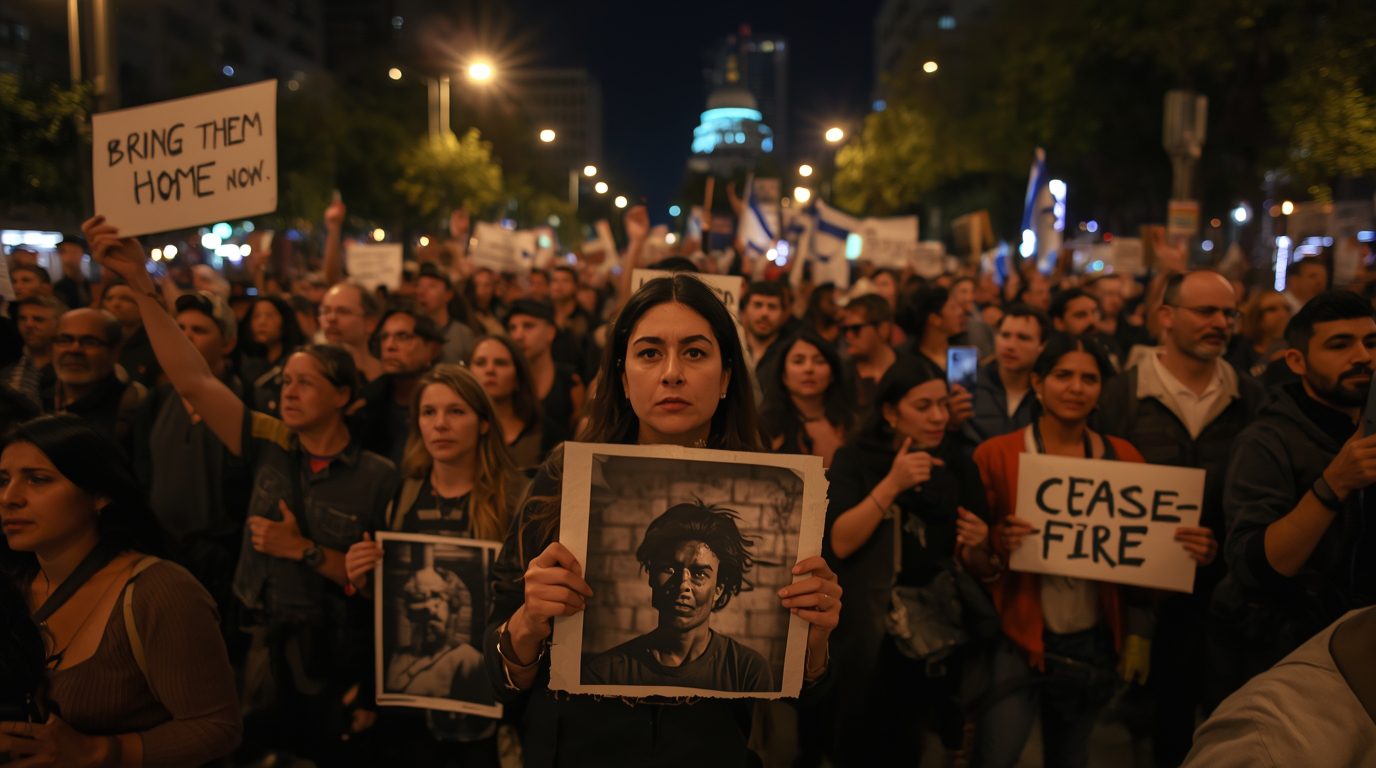Israel Faces Widespread Civil Unrest Over Gaza Conflict
The political climate in Israel is heating up once again, with large waves of Israeli Protesters filling the streets of major cities. The gatherings are more than a show of anger; they reflect a deep national conversation about the ongoing war in Gaza and the deadlock in talks for a humanitarian break and the release of hostages. This once fringed issue is now the lifeblood of a movement that keeps expanding. Outsiders may see the war on TV every night, but the debate on every corner of Israeli sidewalks and over every meal-table is now what is gripping the globe. Two clear sides have formed. One leans on the government’s present strategy; the other presses for a different way to bring hostages who are still held in Gaza back to their families.
Past Weekend’s Major Recognizable Protests in Jerusalem and Tel Aviv
Over the weekend, the Israeli Protesters swelled in size and energy. In Jerusalem, rows of demonstrators crammed the streets beside the Prime Minister’s official residence. Their chants of “elections now” and “bring them home” cut through the chilly night, filling the air like a single rising tide. Police and security forces held a steady, visible ring, and at least a few Israeli Protesters were arrested after some tried to breach the barriers. In Tel Aviv, a sit-in is occupying a major highway, a classic tactic to grab public and media attention in a hurry. This crowd of Israeli protesters is mostly made up of families of the missing, though people from all walks of life stand shoulder to shoulder with them. Israeli Protesters share a single, clear demand: that bringing their loved ones home through a negotiated deal be the absolute top priority, and they think that the current plan still isn’t getting them the results they need. At the heart of the matter is a clash of strategic visions. The government argues that the only way to guarantee the return of hostages and long-term security is to keep operations at full speed. The Israeli Protesters counters that the plan isn’t working, pointing to the empty chairs in their living rooms and the stress on soldiers who live in the same neighborhoods. They want the coalition to pause military actions based on the latest offer, even if that means the state has to swallow some tough concessions. The intensity of their argument is turning them into a steady, unstoppable civilian force keeping the pressure on every member of the cabinet.
Political Impact and Official Reactions
The ongoing mass gatherings are clearly shaping the country’s political scene. Leading figures are facing increased scrutiny from the Israeli demonstrators, who believe decision-makers are not acting fast enough. Some officials have described portions of the assemblies as “counterproductive,” a characterization the organizers firmly challenge. Observers say the sheer regularity and scale of the protests, drawing participants from all walks of Israeli life, suggest the demonstrators’ viewpoint is gaining broad acceptance. The continued survival of the present government now appears tied to its success in addressing the ongoing humanitarian crisis, a point fiercely highlighted with every march, sit-in, and online campaign.
The Human Element: Families Leading the Appeal
At the center of the movement are the relatives of those still unaccounted for. Their unyielding campaigning and moving public testimonies have elevated the Israeli protesters’ message to a national platform. Many relatives have become unofficial spokespersons, meeting with ministers, granting interviews, and addressing foreign media. These personal stories have made the crisis feel immediate and personal to every citizen, fortifying the demonstrators’ determination.
Looking Ahead: A Path Yet Unclear
The situation in Israel remains fraught. Reports say talks on key reforms have hit another “stall,” and the energy we’ve seen from the Israeli Protesters is likely to build in the weeks ahead. These days are critical. Will leaders in Jerusalem shift strategy now that protests have reached their loudest domestic pitch? Or must marchers take bolder steps to keep their message on the agenda? Time is the judge. What is certain, however, is that these committed marchers have pulled the debate on the future from the sidelines to the center stage. Security, justice, and the character of the state are no longer discussed in quiet corridors; they are the headline. Diplomats in capitals from Brussels to Washington watch closely, knowing that the choices made on the streets are choices that will shape Israel’s next chapter, and that chapter is still being written.
Stay updated with reliable news:
Sports: Sport Flash HQ
Business: Biz Rush
Weather: The Climate Post
Travel: Neon Report
US Local: 24 Hour Bulletin
India Finance: The Lucky Ledger
General: The Chrono Post

